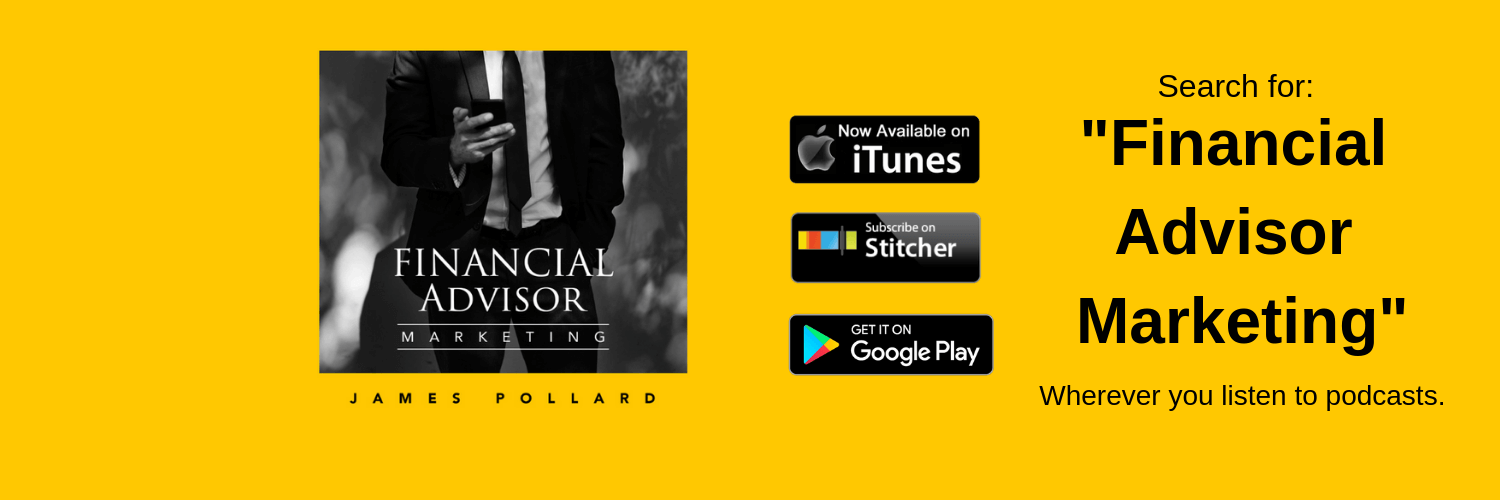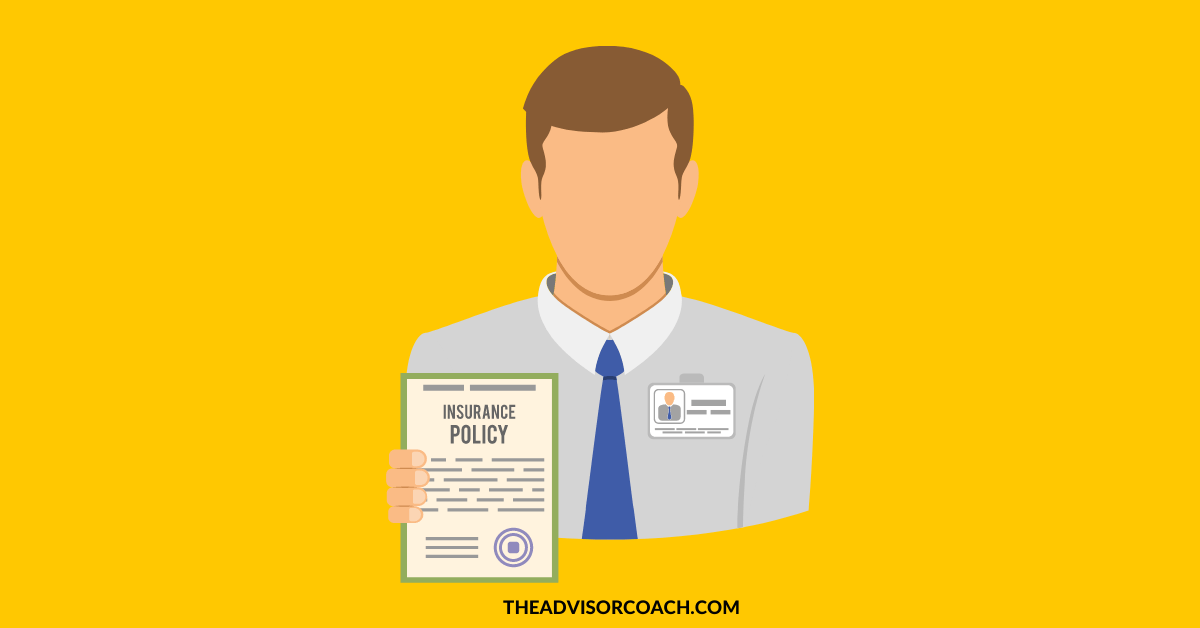10 Insurance Marketing Tips, Ideas, And Strategies (That Actually Work)
Even though I primarily work with financial advisors, a large chunk of my audience is made up of insurance agents.
Every week, I get a few emails from insurance agents asking for my favorite insurance marketing tips, ideas, and strategies that actually work. Why? Because insurance marketing can be difficult. It can be hard to find new customers and clients. Fortunately for you, here are some of my favorite insurance marketing ideas: 1. Leverage Email Marketing
Email marketing is one of the best tools for marketing, period. Not just for insurance agents.
This is because most consumers prefer email than any other form of marketing, which means a large percentage of consumers have made purchases and scheduled appointments directly from their inbox. If you’re an insurance agent who wants to do email marketing, here’s my advice: focus on building your email list. It’s an asset that you own and control. It’s also a way for you to follow up with your prospects and provide valuable information to them until they’re ready to do business with you. However, don’t make the mistake of sending out canned, cookie-cutter emails. One of the biggest keys to success in insurance email marketing is keeping the content engaging. I’ve seen several insurance agents do this by sharing funny stories about their families and clients. Also, make sure you include a link to an online scheduler in your emails - this is one of the best ways to get appointments on autopilot. If you can link your email autoresponder to your online scheduler, you can literally sit back and watch the appointments come in. Finally, make sure you take advantage of your email signature. Use it to include not only your calendar but your phone number and physical address. Give your prospects multiple ways to contact you. The email signature is one of the most underutilized pieces of “email real estate” that insurance agents can use to get more business. ALSO READ: 10 Insurance Email Marketing Mistakes to Avoid 2. Make Sure Your Branding Is Consistent
Now, I do NOT believe in paying for “branding”. I think that whatever brand you build should be a happy byproduct of the direct response marketing you do on a regular basis.
I also believe that trying to “build a brand” or “get your name out there” is one of the biggest mistakes insurance agents can make because “branding” isn’t targeted. However, you want to make sure that your brand is consistent across all platforms. For example, you should use the same font and color scheme on all of your marketing materials. It’s always bothered me when people use one set of colors on their social media profiles and then switch it up on their websites. It’s confusing to prospects and should be avoided. You should also ensure that the stories you tell and messages you send are consistent across all of your marketing channels. For example, if you tell a story about a client who bought life insurance in a direct mail piece, make sure you test a similar story (or the same story) in your email marketing as well. In a nutshell, building a successful personal brand as an insurance agent comes down to two things - having a clear message and differentiating yourself from the competition. If you can do those two things, you’re golden. Just make sure it’s consistent across all channels. 3. Consider Podcasting
One common question I get from financial advisors and insurance agents is, “Should I start a podcast?”.
My answer is almost always “no”. It’s not because I don’t recognize the value in having a podcast - heck I even have my own - but it’s because insurance marketing should be done by using OTHER people’s podcast. That’s the key to leverage. If someone else has already built an audience that trusts them and follows them, why not go there? Several financial advisors I know have used this technique to reap massive rewards. For example, a financial advisor who works specifically with dentists might make it his/her mission to get featured on podcasts made for dentists. By doing that, the advisor can get his/her message out to hundreds (or thousands) of targeted prospects at the same time. 4. Send Some Direct Mail
Direct mail is one of the most popular insurance agent marketing techniques for a reason - it works!
One of the best things about direct mail is that once you’ve got a winning piece, you can scale it up to tens of thousands of people. Plus, it can be easily automated by using an outside company. The only “downside” is that it costs considerably more than the other marketing strategies on this list. However, it’s still cheap. At the time of this writing, a “Forever” stamp in the U.S. is fifty cents, which means sending out a nice mailing in a #10 envelope shouldn’t cost more than a dollar. Another amazing thing about direct mail is that it’s easy to reverse-engineer. For example, if each mail piece costs you a dollar and you want to send out a thousand pieces, it will cost you $1,000. However, if you convert 4 people to clients who each make you $500, then your total revenue generated is $2,000 and your ROI is 100%. Not a bad deal! Of course, you can run the numbers to suit your own business but it’s easy to reverse-engineer. Here’s one tip that can make your direct mail more effective - include a link to your website! According to the DMA (Data & Marketing Association), after receiving a mailer, 44% of people will visit a company’s website and 34% will search for the company online. If you’re not including a link to your website (or making your website user-friendly) then you’re leaving a lot of money on the table. 5. Launch a PPC Campaign
A word of warning - insurance marketing through PPC ads can be notoriously expensive. According to Wordstream, PPC ads about insurance are THE most expensive ads to run on Google. Some sample queries include:
If you don’t have any experience with PPC, I would recommend staying away from these keywords. If you don’t know what you’re doing, it’s a good way to burn money. However, if you want to get started with PPC, here is my philosophy… I believe that you should start with the “easiest” keywords first. If you can’t make any money with those, then you probably can’t make any money elsewhere. The “easy” keywords are the ones that are super-specific. If you’re a life insurance agent in Houston, Texas then you can target the keyword “life insurance agent in Houston Texas”. Or you can target “life insurance agent” and refine that targeting by geography and choose to only show the ad in Houston. Doing this means that you’re only showing your ads to people who have specifically asked for a life insurance agent in Houston, Texas. Because this is about as specific as you can get, if this doesn’t work for you, you can rule PPC out of your marketing strategy. If you actually do this, let me know your results. I’m always interested to hear what insurance agents are doing with their PPC campaigns and I like to know if they can compete or not. :-) Another great way for insurance companies to leverage PPC is to start running retargeting ads. Retargeting ads are essentially where you show your ads (aka “retarget”) to people who have already interacted with you in some way. Some of my favorite retargeting ads to run are those that retarget people who have visited an insurance company’s “contact” page or scheduling page yet didn’t schedule an appointment. By doing this, insurance companies are able to pick up a few appointments they wouldn’t have gotten otherwise. I also think you should create ads for every type of insurance you offer. This means you should create an ad for life insurance, an ad for health insurance, an ad for auto insurance, and so on. Doing this will help your ads appeal to people who are interested in that particular type of insurance. I like to use pizza as an example of why you should break up your ads. Some people like cheese pizza, while other people like pepperoni pizza. Rather than creating one ad for pizza, you’re much better off creating one ad for the cheese pizza lovers and another ad for the pepperoni pizza lovers. Finally, don’t be afraid to study the ads your competitors are running. If you have an insurance competitor who has been marketing with the same PPC ad for the past year, it’s probably making money for him/her. Model that ad for your own business and see if you can improve it. 6. Optimize For Search Engines
SEO is a must for getting found online. All good insurance marketers understand the value of optimizing a site for search. Search Engine Optimization (SEO) is the process of getting traffic from the “free” organic search results on search engines… as opposed to paying for ads.
For example, if you search “insurance agent in Colorado”, the results underneath all the ads are the organic search results. Optimizing your website for search is a way to get your page there. Of course, I could write an entire book on SEO alone… and I definitely can’t cover all the basics here… but here are a few tips:
If you want to know even more about SEO, check out this post: 3 Must-Have SEO Tips for Financial Advisors 7. Use Social Media
Social media is an absolute goldmine for insurance marketing. Even though I’m someone who works primarily with financial advisors, the insurance agents in my Inner Circle have written me about how they’ve been crushing it using social media.
Unfortunately, most insurance agents are either not using social media at all or using it poorly. For example, some people still treat social media as an online billboard. The key word in social media is “social”. Billboards aren’t social. You should be engaging with your audience. I’m always improving with my own social media marketing, but I’ve found that sharing long-form content and images tends to work best for me. That may not be the case for everyone but that’s what has been working for me in the past year or so. I’ve also noticed that when trying to market their insurance agency on social media, insurance agents post stuff that’s devoid of any personality. I see financial advisors do this too. Social media is a great way to share your personal brand. Who are you really like? Let that shine through on social. I’ve found that the more I let my personality shine through (on all my marketing channels), the more the right types of people are attracted to me. Insurance agents should become more active on social media because social media builds trust. According to an IBM survey, only 43% of consumers trust the insurance industry. If you don’t have systems in place for building trust, you’re going to fight a huge uphill battle! When you become active on social media, you slowly but surely build meaningful and engaging connections with your audience. This builds trust. One of the most effective insurance marketing strategies I’ve ever seen involves answering your prospects’ questions before they ask them on social media. If you’ve been in business for several years, this should be easy for you to do because you should already know the questions your prospects ask. So, create a list of questions your prospects are asking and then write a post or article answering each of those questions. Don’t skimp on this - take your time and make sure your answer is thorough. The article you’re reading right now is an example of me practicing what I preach because I get asked about insurance marketing ideas all the time. I figured I would take the time and write out an entire article about it. :-) ALSO READ: 7 Easy & Actionable Social Media Marketing Tips for Financial Advisors 8. Conduct Webinars
One insurance marketing tactic that’s been gaining a lot of headway recently has been webinars.
Webinars are great tools because they allow you to leverage your time efficiently. It’s just as easy to conduct a webinar with one person as it is to conduct a webinar with a thousand people. Plus, once you have a winning webinar script, you can scale it up with PPC. When it comes to insurance agents, webinars help showcase expertise, demonstrate thought leadership, and elevate the conversation from insurance sales to trusted consultant. Again, a large part of insurance marketing involves building trust and webinars do that well. Perhaps the most critical part of creating an engaging webinar is to find a topic that interests your clients and prospects. This is another reason why you should have a go-to list of frequently asked questions. Some of the most common questions include:
I’ve also seen insurance agents record their webinars and use them as part of their follow-up sequence. For example, an insurance agent may include a link to his/her webinar in an email autoresponder sequence and track whether or not the prospect watched it. From there, the insurance agent can tailor the follow-up. ALSO READ: 6 Video Marketing Tips for Financial Advisors 9. Develop A Solid Referral Strategy
Referral marketing is one of my specialties. In fact, I wrote an entire book on it called 51 Referral Marketing Tips for Financial Advisors. I have several tips on how insurance agents can get more referrals. Here are a few…
First, develop relationships with centers of influence in your area. This could be other businesses who target the same demographic or pharmacists and health practitioners in your area. These people can help you build a substantial pipeline of referrals. You could also develop partnerships with other brokers to get their unwanted prospects. If you belong to a regional underwriter association, you can establish relationships to share leads with people who work in other market segments. For example, if you sell mostly Medicare coverage, you can partner with someone focused on Individual & Family plans. You can also create a referral reward program. This is an established system you use to thank clients who refer to you. There are lots of different ways to do this, but the idea is that you want an established, repeatable, and easy-to-follow system. It could be as simple as giving a gift to those who give you referrals. It’s up to you to decide. 10. Get Disciplined With Your CRM
I can’t believe how many insurance agents are still out there who either don’t use a CRM or use it infrequently.
One of the best insurance marketing tips I can give you seemingly has nothing to do with insurance marketing - it’s getting to know your CRM. Take a day out of your calendar and do nothing but get to know your CRM’s features. Call up your CRM company and ask them to walk you through some of the little-known tips and tricks of their power users. If you’re a paying customer, they should be receptive to the idea. A nice “quick win” most insurance agents can use with their CRM is to integrate with the other tools they’re using. For example, you should integrate your CRM to your calendar, your email autoresponder, your website forms, and your phone number. That way a lot of the heavy lifting is already done for you. You just have to log in and add additional notes, feedback, etc. Managing your CRM is arguably the single best way to stay on top of your various marketing channels and follow up with your prospects. It allows you to see who is likely to convert and who isn’t. It also allows you see which marketing channels are working well and which aren’t. ALSO READ: Best CRM For Financial Services So, those are ten of my favorite insurance marketing tips, ideas, and strategies that actually work. If you’d like to continue reading some more about insurance marketing, here are some of my other articles: The Top 10 Best Books for Insurance Agents Life Insurance Leads - Should You Buy Them? 7 Horrible Insurance Marketing Ideas Thank you for reading this and I’ll catch you down the road! :-) |




